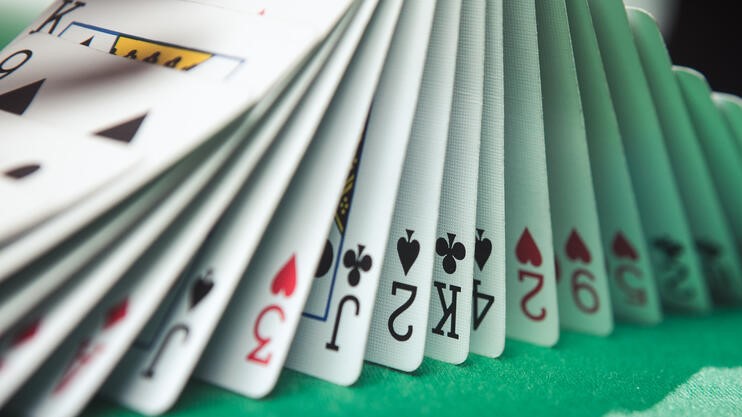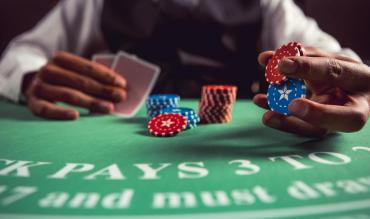“Have you ever caught anyone card counting?” As a croupier, working in London’s high end casinos, this was one of the questions I was asked most – often by people who’d never been to a casino, who wouldn’t even know how to play blackjack. The notoriety of this form of cheating is probably due at least in part to Ben Mazrich’s bestselling account of a group of card counting students who won millions in Vegas. Mazrich’s 2002 book, Bringing Down the House: The Inside Story of Six M.I.T. Students Who Took Vegas for Millions, was followed by 21, a 2008 film adaptation starring Kevin Spacey as the Svengali behind the students’ Vegas trips.
In the story (billed as non-fiction, but possibly embellished) the students work as a team, with some taking the role of "spotters" who place the minimum bet and keep track of the count, while others take on the role of big players who come over and place large bets when the spotters send them a signal that the count is in the players’ favour.
Had I read the book? I was often asked. Had I seen the film, and was it really like that? Actually no. A bunch of chancers working together would have stood out a mile in a small private members’ club in London. In one casino I worked in, the main gaming floor offered just two roulette tables, and two card tables – only one of which was blackjack. Membership was granted to such a select few that staff often outnumbered players by about ten to one, so there was no chance of a rogue group of con artists slipping in and getting a card counting scam going.
Players sometimes tried card counting, but the fact is, it’s pretty tricky to make a success of it. So although we were trained to spot card counting, it wasn’t considered an issue as long as the players were losing. In over a decade, I only knew two players to be barred for it, and that was because they were winning consistently – the card counting itself wasn’t really the concern.
In fact, the most common form of cheating on blackjack can simply be summed up as “lying.” Here are the top five ways I saw players lie in an attempt to win more money on blackjack:

BLACKJACK CHEAT #1: PRETENDING THEY DIDN’T WANT A CARD
In its most basic form, this means a player asking for a card, then claiming they didn’t want it, if the card makes their hand go bust. Players will try this even if they’ve clearly tapped their box for a card, or verbally asked for one – or a combination of both. They then expect the dealer to take back the card they’ve now decided they don’t want. As outrageous as this may sound, it should be no surprise if you’ve read my recollections of how players in Mayfair cheat on roulette.
A variation of this is waiting to see what the live blackjack dealer gets, then deciding they didn’t want the card they’d asked for. In one case, a guy who was always cheating got a three when he asked for a card. I then drew a ten, on the ten I had already – this made twenty, which beat both his hands. I took the losing bets, put away the cards and only then, when he’d had time to consider it, did he claim he hadn’t wanted a card. His rationale was that if I took the three, then drew the ten, I’d go bust with 23, and he’d be paid on both boxes. And as so often happens in Mayfair, he got away with it.
BLACKJACK CHEAT #2: PRETENDING THEY HAD WANTED A CARD
This is my friend Jack’s pet hate. He says, “the worst thing is when they have something like 17, and of course they don’t want a card. But say the dealer has a ten, then they pull an Ace – so the dealer has blackjack – suddenly the player claims they wanted a card on 17!”
BLACKJACK CHEAT #3: PRETENDING THEY’D WANTED TO DOUBLE
So in this instance, a player asks for a card, then when it turns out to be a good one, they’ll claim they wanted to double their initial bet. Of course, they haven’t asked to double, or put out the money to double, or given any indication that they want to double – because of course this is only something they’ve only decided afterwards once they’ve seen the card!
BLACKJACK CHEAT #4: BETTING OVER OR UNDER THE TABLE MINIMUM
Players sometimes deliberately bet over or under the table minimum, in the hope that the dealer won’t notice, and that they’ll be able to turn that to their advantage. If they bet below the table minimum and the bet loses, they’ll declare it was a “no bet” and ask for their money back, on the grounds that you shouldn’t have allowed it. If it wins, they’ll want to be paid as if they’d bet the higher amount that meets the table minimum. Conversely, if a player bets over the maximum, and it loses, they’ll want the difference back!
BLACKJACK CHEAT #5: SLIPPING IN THE “WRONG” CHIP
If a player changes their bet, it’s best to verbally check they meant to do that, because even if it meets the table’s minimum and doesn’t exceed the maximum, the player will still try to turn it to their advantage if you don’t comment on it. So if they’ve been betting £300 a box on blackjack, eg three chips at a value of £100 each, then they bet £225 eg two chips at £100 and one chip at £25 (especially if the £25 chip is at the bottom), you need to check that’s what they intended to bet, before dealing the hand. Because if that box wins, they’ll claim that they meant to bet £300, and they’d put the £25 chip down by mistake – they’ll then expect to be paid as if they’d bet £300.
And of course if the player bets more than their usual bet, there’s an angle here too! So say they’d been playing £75 a box, eg three chips at a value of £25 each, then they put down £150 eg two chips at a value of £25 and one chip at a value of £100 (especially if the £100 chip is on the bottom) - if that box loses, then rather than losing £150, they’ll want £75 back, arguing that they’d never usually bet £150 and they put the £100 chip down by mistake. If they’re really cheeky, they may even argue that they want the whole bet back because they never bet that much, and “you should have checked!”
Samantha Rea is a London based journalist and former croupier. She can be found tweeting here


